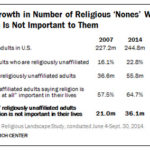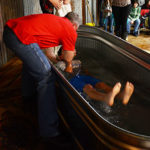NASHVILLE—Americans who don’t go to church are happy to talk about religion and often think about the meaning of life, a new study from LifeWay Research showed.
They’re also open to taking part in community service events hosted at a church or going to a church concert, the research revealed. But only about a third say they would be interested in going to a worship service, and few think about what happens after they die.
Those are among the findings of a new online survey of 2,000 unchurched Americans from LifeWay Research. The survey, conducted in partnership with the Billy Graham Center for Evangelism at Wheaton College in Wheaton, Ill., found more than half of Americans who don’t go to church identify as Christians.
Mostly indifferent to organized religion
But they are mostly indifferent to organized religion, said Scott McConnell, executive director of LifeWay Research.
“Unchurched Americans aren’t hostile to faith,” he said. “They just don’t think church is for them.”
For this survey, “unchurched” means those who have not attended a worship service in the last six months, outside of a holiday or special occasion like a wedding.
Among their characteristics:
- Two-thirds (67 percent) are white.
- Just over half (53 percent) are male.
- About half (47 percent) have a high school diploma or less.
- Nearly two-thirds (62 percent) went to church regularly as a child.
- About a third (32 percent) consider themselves nonreligious
- One in five identifies as Protestant, and one in four as Catholic.
Willing to discuss religious topics
Sign up for our weekly edition and get all our headlines in your inbox on Thursdays
But few are turned off by conversations about faith, McConnell said.
 Nearly half (47 percent) say they discuss religion freely if the topic comes up. A third (31 percent) say they listen without responding, while 11 percent change the subject.
Nearly half (47 percent) say they discuss religion freely if the topic comes up. A third (31 percent) say they listen without responding, while 11 percent change the subject.
Only about a third (35 percent) say someone has explained the benefits of being a Christian to them.
Christians may be reluctant to talk about their faith out of fear of offending their friends, McConnell noted. But the survey found that fear is unfounded.
“Unchurched folks are not being overwhelmed by Christians talking about their faith,” McConnell said. “If faith is important to you, then your friends will be interested in hearing about it.”
Activities that might attract unchurched people
Researchers looked at the kinds of activities unchurched Americans might be interested in, as well as methods for inviting them to church.
 About two-thirds (62 percent) would attend a church meeting about neighborhood safety. Half would take part in a community service event (51 percent), concert (45 percent), sports or exercise program (46 percent), or neighborhood get-together (45 percent) at a church.
About two-thirds (62 percent) would attend a church meeting about neighborhood safety. Half would take part in a community service event (51 percent), concert (45 percent), sports or exercise program (46 percent), or neighborhood get-together (45 percent) at a church.
“Concerns for neighborhood safety and desire to express compassion to the under-resourced seem to be the biggest potential draws for the unchurched to get connected to a church,” said Rick Richardson, professor of evangelism and leadership at Wheaton College and research fellow for the Billy Graham Center for Evangelism. “Invite unchurched people to those kinds of events, and many say they will attend.”
Fewer are interested in attending a worship service (35 percent), recovery group (25 percent) or seminar on a spiritual topic (24 percent) if invited.
Personal touch matters
When it comes to church invitations, a personal touch works better than a sales pitch.
More than half (55 percent) of unchurched Americans say a personal invitation from a family member would be effective in getting them to visit a church. Other methods, such as a church member knocking on the door (21 percent), a TV commercial (23 percent), postcard (23 percent) or Facebook ad (18 percent), are less effective.
Looking at the big questions
Researchers also asked unchurched Americans about the big questions of life.
 About seven in 10 agree there’s an ultimate plan and purpose for every person. One in 5 (19 percent) disagrees. One in nine (11 percent) isn’t sure.
About seven in 10 agree there’s an ultimate plan and purpose for every person. One in 5 (19 percent) disagrees. One in nine (11 percent) isn’t sure.
Nearly six in 10 (57 percent) say it’s important for them to find their deeper purpose in life. A third disagree (31 percent), while one in nine (12 percent) isn’t sure.
Few wonder, at least on a regular basis, if they will go to heaven when they die. Just under half (43 percent) say they never ponder that question. One in five (20 percent) isn’t sure the last time that question came to mind. Three in 10 (29 percent) say they ask themselves that question on at least a monthly basis.
This lack of interest in the afterlife can pose a problem for Christians who want to share their faith, McConnell said. Many have been trained to ask questions like, “If you died tonight, would you go to heaven?”
That tactic might not be effective, McConnell said.
“If the only benefit of being a Christian is that you get to go to heaven, most unchurched people don’t care,” McConnell said. “It can’t be the only way of talking about faith.”
Talk about life, not life after death
Instead, McConnell suggested those who want to share their faith talk about how their relationship with Jesus affects them in day-to-day life and discuss the benefits of being part of a church. And be proactive, he said.
“Don’t wait for unchurched people to bring up the topic of faith,” he said. “It’s probably not going to happen.”
Researchers used a demographically balanced online panel for interviewing American adults. They conducted the survey May 23 to June 1. Analysts used slight weights to balance gender, age, ethnicity, income, region and religion. Researchers screened the sample to include only those who have not attended a religious service in the past six months except for a religious holiday or special event such as a wedding or funeral.
The completed sample is 2,000 surveys, providing 95 percent confidence the sampling error from the online panel does not exceed plus or minus 2.7 percent. Margins of error are higher in subgroups.














We seek to connect God’s story and God’s people around the world. To learn more about God’s story, click here.
Send comments and feedback to Eric Black, our editor. For comments to be published, please specify “letter to the editor.” Maximum length for publication is 300 words.